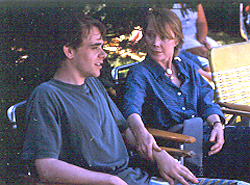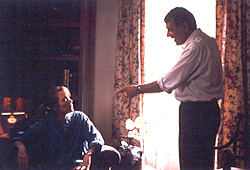Grief plunges the bereaved into a series of wrenching, contradictory, and chaotic emotions. In the Bedroom (2001) is a daring and unsettling film that explores a few of the complex and taboo emotions of mourning. Todd Field, for his debut as a feature film director, has fashioned a nuanced and realistic screenplay with Rob Festinger from a short story by the late Andre Dubus.
Much of the suffering in our lives is brought about not by the actions of external enemies and evil doers but by the violence, ignorance, and resentment within us. Forgiveness offers a way out of this self-created prison. But for many of us, it is a difficult path to travel given our cultural training in the idea of retribution (an eye for an eye) and our acceptance of the psychological shibboleth of closure.
The questions and exercises in this discussion guide are organized around some of the serious themes of this drama — calamity, murder, anger, hurt, listening, evil, and ways to regard our enemies.
In the Bedroom runs 130 minutes and is rated R for some violence and language. For our review of the film and a plot synopsis, click here.
1. CALAMITY
Columnist Sidney J. Harris has written: "Nobody knows himself until he has come face to face with calamity. It is only in crises that we learn our true identity; . . . Many have gone through life thinking they were strong when they were only safe."
- How would you describe Frank's relationship with his father? with his mother?
- Talk about the different meanings of the title. Be sure to discuss the scene where Matt talks about the innermost chamber of a lobster trap.
- What calamity has revealed to you your vulnerability when you thought you were strong?

2. THE MURDER OF A LOVED ONE
"Death from almost any cause, even from an accident, can somehow be dealt with rationally. But if the death is caused by murder, there is a collapse in the heart and soul that cannot be disabled," Antoinette Bosco observes in Choosing Mercy.
- How do Matt and Ruth differ in the ways they express their grief over the loss of their son? What does the scene at the cemetery, where a priest tries to counsel Ruth, reveal about her state of mind?
- A movie, novel, or newspaper story may be the closest we come to someone who has lost a loved one from murder. Talk about a recent experience of this kind of compassion.
3. ANGER
In her book Companion Through the Darkness: Inner Dialogues on Grief, Stephanie Ericsson writes: "Anger does not simply go away if we deny it. It finds a place to reside, either in our behavior or in our bodies, or both. The longer we cap it off, and seal it from the outside world, the more it festers and grows within. Rage is white-hot anger."
- Do you think the anger that festers within Matt and Ruth is caused mainly by the loss of their son or by their outrage over what they see as a miscarriage of justice?
- What elements of anger or rage have been ingredients in your grief after the death of a loved one?

4. COMPASSIONATE LISTENING
"Compassionate listening is a very deep practice," Thich Nhat Hanh writes in Anger: Wisdom for Cooling the Flames. "You listen not to judge or to blame. You listen just because you want the other person to suffer less. The other person might be our father, our son, our daughter, or our partner. Learning to listen to the other person can really help her to transform her anger and suffering."
- Share your reactions to the scene where Matt and Ruth vent their feelings of anger, blame, and resentment. With whom do you identify? Why? What do they learn about each other during the argument?
- What character traits or behavioral patterns have in the past blocked you from the constant practice of compassionate listening? Who has helped you transform your anger and suffering by listening to you without judgment or blame?
5. BREAKING THE LOGIC OF HURT
"Forgiveness is one of the really difficult things in life. The logic of receiving hurt seems to run in the direction of never forgetting either the hurt or the hurter. When you forgive, some deeper, divine generosity takes you over. When you can really forgive, then you are free . . . only the grace of forgiveness can break the straight logic of hurt and embitterment," John O'Donohue notes in Eternal Echoes.
- Share your reactions to the scene where Natalie comes to ask Ruth for forgiveness. What lies behind Matt's talk with Natalie in the store where she works as a clerk?
- Think back to a time when you were unable to break the logic of hurt and embitterment. What made forgiveness such a difficult option?
6. A CHILD OF GOD
"When we are victims of radical evil, we are not asked to forgive the evil act. We are asked to remember that the perpetrator, even though trapped for now in the evil, is nonetheless a child of God. Even when we cannot yet forgive and release that other child of God, and perhaps cannot do so for a long time, we can deliver that person into God's hands, saying, 'Loving God, at this time my hurt is so deep and my heart is so devastated with pain that I cannot even begin to forgive this person. It is enough for me now to know that my wounder is in your hands, even as I am, and with you there is perfect understanding and recompense for all my pain. When the time is right, help me to begin my journey of healing and release," Flora Slosson Wuellner writes in Forgiveness: The Passionate Journey.
- What stops Matt and Ruth from seeing their son's murderer as a child of God?
- What makes the option of an eye for an eye so appealing to people caught up in rage and grief?
- Talk about your responses to Wuellner's steps on the path to forgiveness. What part do you find most healing?
7. STUDY PARTNERS IN THE NEXT LIFE
"In the next life, your enemy will be your study partner — because he can teach you the most. Jews and Palestinians — why are they afraid of each other? Make a list. There's a lot of information here. If we mend our relationship with our enemies, we can learn," Rabbi Nilton Bonder has observed.
- What do you think Matt and Ruth could learn about themselves by studying with Richard?
- Who's your worst enemy? What could he or she teach you? What would it take to mend your relationship right now?
This guide is one in a series of more than 200 Values & Visions Guides written by Frederic and Mary Ann Brussat. Text copyright 2001 by Frederic and Mary Ann Brussat. Photos courtesy of Miramax Films. This guide is posted as a service to visitors to www.SpiritualityandPractice.com. It may not be photocopied, reprinted, or distributed electronically without permission from Frederic and Mary Ann Brussat — except it may be duplicated for use by groups participating in the e-course "Going to the Movies as a Spiritual Practice." For other uses and for a list of guides in the Values & Visions series and ordering information, email your name and mailing address to: brussat@spiritualrx.com.
